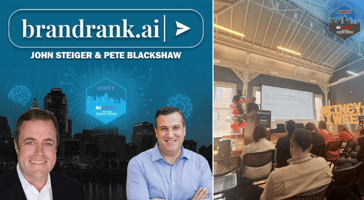New "Defense Layer" Detects Misinformation, Misalignment, and Emerging Reputation Risk Across AI...
Why Brands Are Now “Negotiating Truth” With AI—And Most Are Losing
Inside Answer Economy's shift from search navigation to truth negotiation.
For the past 24 hours I haven’t been able to shake a quote I heard yesterday during a panel I moderated on the “Future of AI Search.”
We were hosting an open house at BrandRank.AI’s Cincinnati headquarters—marketing leaders from P&G, Kroger, Fifth Third Bank, Amazon Web Services, and other major brands packed into the room. The energy was electric as we explored how AI is reshaping search and discovery.

BrandRank co-founder Hank Hudepohl, a search leader going back to his product leadership years at Trip Advisor, explains the transition from search to answers. He is flanked Elisha Hermann (AWS, and Nate Sowder (Fifth Third Bank)
Then Nate Sowder from Fifth Third Bank said something that stopped me cold:
“Search is no longer navigation. We’re really negotiating truth.”
Nate wasn’t talking about SEO tactics. He was describing a fundamental shift in how people interact with information.
The End of Navigation
My co-founder Hank Hudepohl, also on the panel, has been in the search space for decades, most notably during Trip Advisor’s meteoric run as a top global travel site. During our panel, he walked through the evolution: AltaVista, Google’s rise, the long stagnation where search became increasingly ad-heavy and less useful. For twenty years, consumers navigated through ten blue links to find truth themselves.
That world is over.
ChatGPT, Claude, Perplexity—these answer engines don’t give you links to navigate. They present answers directly. Pre-packaged truth, delivered conversationally.
But here’s the rub: Different AI systems present different truths.

Clients, partners, and client prospects of BrandRank.AI joined us to debate the “Future of AI Search” at our official Open House.
Each platform has its own personality and biases. Claude, for instance, is what I call “the college radical”—deeply skeptical of corporate sustainability claims, with the highest ethics bar of any major platform. Lower overall usage, but it’s the AI of choice for journalists, NGO activists, and critical influencers who can make or break your brand narrative. Claude’s parent, Anthropic, is powering Amazon Rufus. Negotiating truth with both Claude and Rufus is no cake walk.
This is what Nate meant. Brands aren’t just competing for clicks anymore. They’re competing to be part of the authoritative answer that AI systems present to users. And you’re negotiating with multiple AI platforms that think differently.
Trust Signals: The New Currency
Over the past year, we’ve run thousands of brand audits. The finding that shocked us: Less than 20% of major brand websites are AI ready. A big reason is that they don’t have—or have buried—their trust signals: third-party credentials, scientific backing, BBB accreditation, Consumer Reports ratings, independent verification.
Unlike Google’s PageRank algorithm, AI systems don’t have a built-in way to determine authority. As Hank explained, these platforms are “searching for quality, trustworthy content” and are “in an arms race to be the most accurate”—they have every incentive to cite authoritative sources.
Our data showed that established credentials like BBB accreditation appear consistently in AI-generated answers, which informed our partnership strategy. But this isn’t just about credentials—it’s about how you structure that credibility on your site.

Here’s an example of how BrandRank.AI “markets to algorithms” its standing with the Better Business Bureau and commitment to “upholding the highest standards…in business practices.” This could also apply to Good Housekeeping, Trust Pilot, Consumer Reports, or credible Green Seals.
Hank put it clearly: “There are things you can do to help the crawler harvest process. There are things you can do to hurt that process.”
Elisha Hermann from Amazon Web Services reinforced this point. With Rufus and other AI-powered shopping tools, Amazon “constantly thinks about our customer and wants them to trust the experience,” looking at signals like customer reviews, review volume, and product ratings. “We’re really looking at different metrics than traditional SEO,” she noted.
The brands winning are making their substantiated claims easily discoverable and verifiable. Then again, you must have those credible claims a starting point... full stop!

Rufus extends beyond product selection to broader coaching and advice. This is one of many approaches the eCommerce giant uses to “negotiate trust” with shoppers.
The Private Label Wake-Up Call
Perhaps our most sobering finding: We studied agentic commerce scenarios where AI optimizes shopping baskets. When consumers ask for “quality products at a good price,” private label shows up with dramatically higher frequency.
Why? AI agents do the homework most consumers skip. They know Kirkland coffee is sourced by Starbucks. They know the quality metrics and price differential. They optimize accordingly.

BrandRank has been running thousands of brands through “agentic” search filters to understand store brand bias in answers. Many categories (food staples, pantry, paper products, OTC medications, basic health supplements) have extremely high exposure when choice-making is delegated to agents.
Elisha Hermann from Amazon Web Services reinforced how little control brands actually have. Regarding Rufus, she noted that brands “can only influence it so much” because “most of Rufus answers come from the consumers”—reviews, videos, and product data. You can’t spin your way into AI’s good graces when the systems are drawing directly from customer experiences.
Jeff Cail, a BrandRank.AI advisor and former President of Ipsos North America, framed this as both threat and opportunity: “If I were a private label brand, I might release scientific evidence comparing my effectiveness to national brands. That would be a clever move.”
But as Jeff noted, national brands can think “one step ahead” and get “your side of the story out there.” The winners will have substantive, credentialed reasons for premium pricing—not just “brand heritage.”

BrandRank.AI advisor Jeff Cail (former BASES/Nielsen and President of Ipsos North America) comments on the impact or AI on private label and store brands.
Transparency In, Trust Out
Nate crystallized our mission with another insight: “Transparency is the input; trust is the output.” This is critical, and lines up well with the three metrics we obsess with daily:
-
AI Visibility - Does your brand appear in answers across platforms?
-
Content Readiness - Is your content structured so AI can understand and trust it?
-
Brand Vulnerability - Do your claims align with what AI actually says about you?
That third metric is critical. We score brand alignment on a 1-10 scale. Below 8, you’ve got problems—legal exposure, activist targeting risk.
We compare what brands claim against what Claude, ChatGPT, and other platforms say about them. The gaps are stunning. A CEO talks sustainability, but the AI systems tell a different story based on their source analysis.
Every journalist, analyst, and conscious consumer is now using these tools to verify claims. The negotiation is happening whether you’re at the table or not.
The Strategic Shift
One final point. The panel also discussed the upside of optimizing for human problems, not just product features.
Nate illustrated this perfectly with banking. Functional keywords like “checking account” are commoditized. Emotional keywords like “not running out of money this month” or “raising a responsible adult”—those are differentiated.
Here’s the upside: When you optimize for real human problems instead of product features, you’re not just gaming AI algorithms—you’re actually becoming more helpful to customers. AI systems are trying to be helpful. Write content that addresses real customer problems, back it with credible evidence, earn third-party validation. That’s how you win the negotiation for truth.
The Path Forward
Standing in our Cincinnati office yesterday, watching brand leaders grapple with this new reality, I felt both uncertainty and excitement. We’re at an inflection point.
It’s uncomfortable. For some brands, it will be existential.
But for those willing to do the genuine work—making substantiated claims, earning credentials, being transparent about limitations—this is an opportunity.
Because “AI cuts through the slogans and spin to get to substance.”
So make sure you have substance worth finding.
The negotiation for truth is already underway. The question is whether you’ll be part of the answer.



